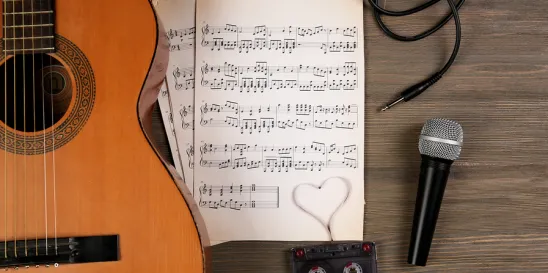On January 10, the State of Tennessee and the US House of Representatives took separate steps towards protecting recording artists and the music industry from the use of AI technologies to create recordings that replicate or imitate an artist’s voice without the artist’s consent. The State of Tennessee announced a proposed state bill entitled the “Ensuring Likeness Voice and Image Security (ELVIS) Act,” while the House of Representatives introduced a federal bill entitled the “No Artificial Intelligence Fake Replicas and Unauthorized Duplications Act of 2024” or “No AI FRAUD Act.”
From the release of “Heart on My Sleeve” in the spring of 2023, the hit viral music recording featuring unauthorized Drake and Weeknd replica vocals, to Bad Bunny publicly criticizing the slew of viral TikTok songs featuring his “soundalike” vocals at the end of 2023, there has been no shortage of controversy surrounding replica vocals that are generated using AI technology. The rise of unauthorized “soundalikes” has elicited considerable demand for rights of publicity at the state level to expand to include protection for an individual’s voice, and for the creation of a right of publicity at the federal level that includes protection against the unauthorized use of an individual’s voice.
State right of publicity laws vary from state to state, typically extending only to an individual’s name, image, and likeness. Because the scope of protection, duration of protection, exceptions to protection, and remedies for violation vary significantly from state to state, the rise in the use of AI technology being used to create unauthorized “soundalike” recordings has led to a groundswell of support in the music industry for the creation of a uniform right of publicity in the form of a federal right of publicity that would include protections of an individual’s voice. It was a good day, then, for the music industry when the ELVIS Act and the No AI FRAUD Act were announced.
The ELVIS Act
The ELVIS Act was introduced by Tennessee Governor Bill Lee alongside State Senate Majority Leader Jack Johnson (R-27) and State House Majority Leader William Lamberth (R-44). It seeks to prevent the production and distribution of audio-visual and sound recordings featuring unauthorized AI-generated replica vocals of an individual without said individual’s consent. Tennessee law currently protects an individual’s image, photograph, and likeness from being exploited without consent, but the protection does not extend to an individual’s voice. According to the announcement that Governor Lee’s office made, “if enacted, the ELVIS Act would be the first legislation of its kind in the nation to build upon existing state rule protecting against the unauthorized use of someone’s likeness by adding ‘voice’ to the realm it protects”. The announcement also indicated that the ELVIS Act is supported by the Screen Actors Guild – American Federation of Television and Radio Artists (SAG-AFTRA) and the performing rights organizations American Society of Composers, Authors and Publishers (ASCAP), Broadcast Music, Inc. (BMI), Global Music Rights (GMR), and the Society of European Stage Authors and Composers (SESAC).
The No AI FRAUD Act
At the federal level, the No AI FRAUD Act was introduced by Rep. María Elvira Salazar (R-FL), alongside Reps. Madeleine Dean (D-PA), Nathaniel Moran (R-TX), Joe Morelle (D-NY), and Rob Wittman (R-VA). The bipartisan House bill cites recent unauthorized AI-generated projects (like “Heart on My Sleeve”) and targets “abusive AI deepfakes, voice clones, and exploitive digital human impersonations.” The No AI FRAUD Act comes on the heels of the proposed bipartisan Senate bill entitled the “Nurture Originals, Foster Art, and Keep Entertainment Safe Act (NO FAKES Act), which was announced in October 2023 and is intended to “protect the voice and visual likeness of all individuals from unauthorized recreations from generative artificial intelligence (AI)”.
The No AI FRAUD Act aims to provide all individuals with federally protected rights to exclusively control the use of their likeness and voice. Said rights would be freely transferable and descendible property rights that do not expire upon the death of the individual. The Act would prohibit creating and making available to the public a “personalized cloning service”, and prohibit the creation, publishing, or otherwise making available to the public any AI-generated replicas of an individual’s voice or likeness without the individual’s consent. The Act would also prohibit the facilitating of any of the aforementioned activities. Remedies of statutory or actual damages are provided in the event of a violation. However, the Act would provide that First Amendment protections can be a defense to an alleged violation.
In its current form, an action for violation of the No AI FRAUD Act may be brought by: (1) the individual whose voice or likeness is at issue; (2) any other person or entity to which the individual has assigned or exclusively licensed their voice or likeness rights; or (3) if the individual performs music as a profession, by any person or entity that has entered into a contract for the individual’s exclusive personal services as a recording artist or for an exclusive license to distribute sound recordings that capture the individual’s audio performances. The No AI FRAUD ACT is not intended to in any way limit any rights an individual may have under any other law providing protections against the unauthorized use of an individual’s name, voice, or likeness.
Among the proponents of the AI FRAUD Act are Universal Music Group, SAG-AFTRA, and the Recording Industry Association of America, who each put out statements in support.
Key Takeaway
The introductions of the ELVIS Act and No AI FRAUD Act demonstrate that politicians are listening to concerns raised by musical artists and the music industry and recognize the importance of empowering them with rights to fight against the use of AI technology that exploits an individuals’s voice without authorization.




 />i
/>i

